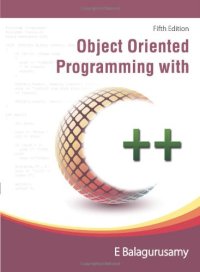
Ebook: Object Orinted Programming With C++
Author: E Balaguruswamy Balagurusamy
- Genre: Computers // Programming: Programming Languages
- Tags: C++, OOP
- Year: 2011
- Publisher: McGraw-Hill Education - Europe
- Edition: 5
- Language: English
- pdf
C++ is one of the most popular object oriented programming languages, and there are many versions and variations of the language available. This book focuses on the original version of the language, ANSI C++.
The book starts with an introduction to the principles of Object Oriented Programming or OOP concepts. Object Oriented Programming differs greatly from the older procedure oriented programming concepts. In OOP, data and the operations performed on it are abstracted and encapsulated.
Access to the data and the functions that work on the data are provided through a transparent interface. If any changes are made to the data definitions or functions, these do not affect the other parts of the applications that use them, as the interface remains the same. Thus, changes are easier to implement and the defined classes can be reused and extended through inheritance.
All these concepts are explained in detail in this book, for the readers to get a good understanding of OOP principles first. The author then introduces C++. C++ is an extension of the C language, which was developed by Bjarne Stroustrup at Bell Labs. Initially, the language was called C With Classes, as it added the concept of a class, the basic building block of OOP, to the C language. As the language underwent further development and revisions, Stroustrup changed the name to C++, a play on the incremental operator in C.
The book starts with the basic concepts of tokens, expressions, control structures, and the concept of functions in C++. Hardcore OOP implementations are explained next, starting with classes and objects, constructors and destructor, type conversion and overloading.
Further, OOP principles like inheritance, virtual functions, and polymorphism are explained with examples. The book then takes a look at console I/O operations and file handling. The author then explains the concept of templates and handling exceptions.
The book starts with an introduction to the principles of Object Oriented Programming or OOP concepts. Object Oriented Programming differs greatly from the older procedure oriented programming concepts. In OOP, data and the operations performed on it are abstracted and encapsulated.
Access to the data and the functions that work on the data are provided through a transparent interface. If any changes are made to the data definitions or functions, these do not affect the other parts of the applications that use them, as the interface remains the same. Thus, changes are easier to implement and the defined classes can be reused and extended through inheritance.
All these concepts are explained in detail in this book, for the readers to get a good understanding of OOP principles first. The author then introduces C++. C++ is an extension of the C language, which was developed by Bjarne Stroustrup at Bell Labs. Initially, the language was called C With Classes, as it added the concept of a class, the basic building block of OOP, to the C language. As the language underwent further development and revisions, Stroustrup changed the name to C++, a play on the incremental operator in C.
The book starts with the basic concepts of tokens, expressions, control structures, and the concept of functions in C++. Hardcore OOP implementations are explained next, starting with classes and objects, constructors and destructor, type conversion and overloading.
Further, OOP principles like inheritance, virtual functions, and polymorphism are explained with examples. The book then takes a look at console I/O operations and file handling. The author then explains the concept of templates and handling exceptions.
Download the book Object Orinted Programming With C++ for free or read online
Continue reading on any device:

Last viewed books
Related books
{related-news}
Comments (0)